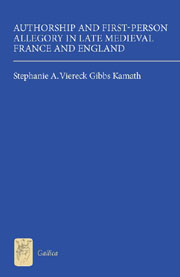Book contents
- Frontmatter
- Contents
- Dedication
- Acknowledgements
- Abbreviations
- A Note on Names, Sources, and Translations
- Introduction
- 1 “Comment ot nom”: Allegory and Authorship in the Roman de la Rose and the Pèlerinage de la Vie Humaine
- 2 “What so myn auctour mente”: Allegory and Authorship in Geoffrey Chaucer's Dreams
- 3 “Thereof was I noon auctour”: Allegory and Thomas Hoccleve's Authority
- 4 Verba Translatoris: Allegory and John Lydgate's Literary Tradition
- Coda
- Bibliography
- Index
- ALREADY PUBLISHED
3 - “Thereof was I noon auctour”: Allegory and Thomas Hoccleve's Authority
Published online by Cambridge University Press: 05 February 2013
- Frontmatter
- Contents
- Dedication
- Acknowledgements
- Abbreviations
- A Note on Names, Sources, and Translations
- Introduction
- 1 “Comment ot nom”: Allegory and Authorship in the Roman de la Rose and the Pèlerinage de la Vie Humaine
- 2 “What so myn auctour mente”: Allegory and Authorship in Geoffrey Chaucer's Dreams
- 3 “Thereof was I noon auctour”: Allegory and Thomas Hoccleve's Authority
- 4 Verba Translatoris: Allegory and John Lydgate's Literary Tradition
- Coda
- Bibliography
- Index
- ALREADY PUBLISHED
Summary
Thomas Hoccleve (c. 1366–1426) is famed as the “first autobiographical poet” of the English language. His three major works, La Male Regle (c. 1406), the Regiment of Princes (c. 1411), and the compilation of texts known as the Series (c. 1419–1421), all employ a first-person voice that assumes the name of the poet and expresses a wealth of self-referential detail unparalleled in fifteenth-century poetry. The most remarkable quality of Hoccleve's poems, however, is their curious expression of topical and personal concerns through a language of “small-scale personification”: the poems regularly invoke abstract or imagined figures as characters, although their interaction never develops into an extended, continuous narrative. Hoccleve's narrator describes very concrete, socially-specific motivations for writing but does so by envisioning his struggle with forces whose reality is far from concrete. La Male Regle writes the repentance of a spendthrift in seeking arrears in pay from Lord Furnivall, but the narrator directs his pleas to Health and Fortune more often than to Furnivall. The Regiment of Princes introduces advice offered to the ascendant Henry, Prince of Wales, in the context of the poet's anxious desire for a reliable court pension in old age. The Regiment initially expresses this desire, however, not by direct petition but by depicting the narrator actively wrestling with the blood-sucking horror of Thoghte (Anxiety). The Series purports to stake Hoccleve's claim to sanity and his willingness and ability to serve his patron, Duke Humphrey.
- Type
- Chapter
- Information
- Publisher: Boydell & BrewerPrint publication year: 2012



